Why is it interesting for me to study in a Moscow university?
“What distinguishes classical mathematics from applied mathematics? The fact that a classical mathematician solves problems that can be solved and does it as needed, and an applied mathematician solves problems that need to be solved and does it as much as possible. ” Professor Krapuhina N.V.
Greetings to the habrasoobschestvo!
A new academic year has begun, and in connection with this event, I would like to share with you my teaching history at the Moscow University. I am a student of the 5th year of the Department of Engineering Cybernetics of NUST MISiS. Many have probably heard about this university, since our former rector D.V. - The current Minister of Education.
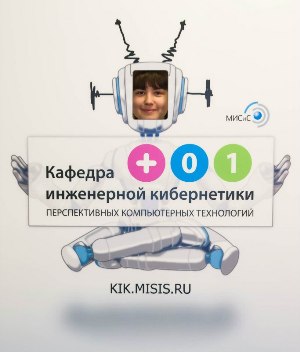
')
I apologize in advance that this topic is not in the hub "The educational process in IT." As it turned out, I do not have enough karma. Please do not judge strictly, I tried to find similar hubs on the subject.
The Department of Engineering Cybernetics of MISiS was formed in 1967 by the famous Russian scientist, academician of the Russian Academy of Sciences, Professor S. Yemelyanov, has a rich history, who can be interested, can read here .
When I enrolled, the department still produced specialists. After our stream, one more year was accepted for a specialty, and then the whole university went on to undergraduate training. A set of academic disciplines in many ways similar to other IT-specialties. We teach C / C ++, C #, assembler, methods for building intelligent systems, networks, operating systems, decision support theory, system analysis, etc., as well as we have advanced mathematical courses, such as functional analysis theory, complex variable theory and optimization methods. In general, the traditions of teaching the exact sciences are still among the strongest in the country.
Start
The first couple of years at the institute are all about the same. There is an adaptation to the new rhythm and the realization that the institute is not a school, where all the time teachers are watching and forcing even the most lazy to do something.
I remember the very first pair - it was a mathematical analysis. He was led by Professor Trenogin V.A. Perhaps you know him, he is the author of a large number of books on mathematics. It was a seminar, and the professor wrote a fraction of two polynomials on the board without prior explanation with only one comment: “Solve”. For me it was a terrible surprise, because it was completely unclear what exactly needed to be solved and how. A bit later, the professor already explained what this task was, and we still remember with classmates how each of us went deep into our notebooks, diligently calculating something, although no one had any idea how the limits are considered.
In addition to the usual set of subjects of the specialty Applied Mathematics, the department has additional training. Since that year, as I entered, Cognitive Technologies began to train a team on sports programming at the department. Anyone could "train", it was necessary to successfully solve two introductory tasks. Unfortunately, I did not have the opportunity to join the team, because at that moment I was working as an additional education teacher for schoolchildren, and this took some of my time. A sports programming classes require full-fledged return and take all extracurricular time. Such an intensive program allowed our children to reach great heights in three years and reach the final of the ACM ICPC World Championship. The guys also entered the top ten teams of the international KPI-Open Olympiad. They are our pride!

What's next?
Starting from the 3rd course, the department is taught special disciplines. Such courses as the theory of automatic control, methods of mathematical modeling, computer graphics appeared.
In general, in recent years, many interesting things have appeared at the institute. Famous scientists come to us. We have joint projects with many of them. Students have a real chance to participate in their research. This summer, Yuri Estrin (Australia) visited us. He became the head of the new laboratory at MISiS. Advisor to the President of the USA on science John Holdren. Together with the American MIT, Fablab opened a laboratory in which, using 3D printing technology, it is possible to manufacture prototypes of innovative products.
At the 4th year students choose scientific leaders, and at the end of the year they begin to prepare for the thesis work. Students choose the most interesting direction for them and, together with their supervisors, discuss topics for diplomas, write the first sketches. By the way, it was on the 4th year that the leadership changed, the department head was O.A. Uskova, president of Cognitive Technologies. With her arrival, new training courses were added, which began to distinguish our department from others. For example, such subjects as "Cloud computing" and "Theory of startup projects". They are read by top managers of Cognitive. They participated in large IT projects, such as the creation of information systems on a national scale. We were also told about how network communities are organized and how to properly use their tools. Were also organized training laboratories, where students are engaged in real projects with IT specialists. Those who really wanted to, and already learned something, were hired by Cognitive. Today there are already 15 people working there, starting from the 2nd course, and get paid.
And the department was renovated, updated appliances and furniture. Abstract paintings were hung on the walls. These are works by famous Russian artists, the founders of one of the world's best techniques for the formation of creative thinking. It is said that there are only two such strong schools. We have at Harvard.

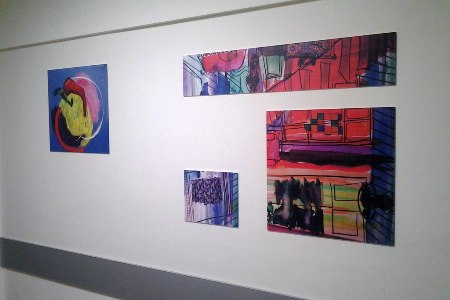
Yes! We also have soft ottomans, where you can spend time on free pairs.
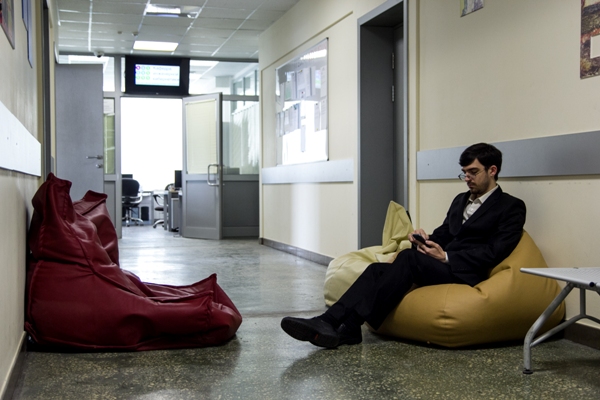
Such an informal setting helps to distract from the educational process, change the picture, and often with the guys during this "relaxation" there are all sorts of cool ideas. For example, we often discuss how it would be great to live in a new model city, in a “smart” city. Not just returning to this topic, we decided to try to create our own concept of a “smart” city, but to begin with solving the problem with traffic jams, because in Moscow this problem is very topical, and every morning we and all Muscovites spend hours in transport to get to work and study. At the moment, this idea has already grown into a start-up project, in which the student of our department, Senchenko Roman, is engaged. He creates a system that will allow the construction of simulation models of the transport network to support decision making using cellular automata.
At the Department of Engineering Cybernetics, as well as throughout MISiS, there are a lot of nonresident students. They live together in a hostel. By the way, the hostel is another reason for our pride. Campus takes the first place among Moscow student hostels and the third place among all-Russian!

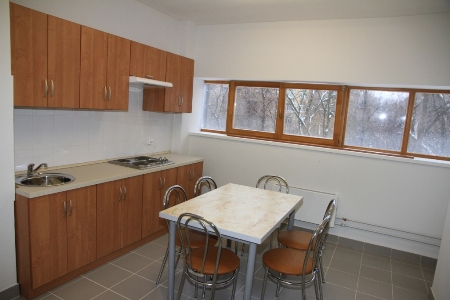
I would also like to separately tell about the student self-government in the department, which appeared this year. It is called the Open Government and consists of four people: the chairman and four ministers in various areas. The children are an intermediary between students and the leadership of the department, are engaged in organizing students' leisure time, help with employment, organize in-depth seminars and discussions on academic disciplines, as well as interact with other structures of the IIA. Not every student could get there, namely the one who studies at the department, and the one who won the election. And before the elections, all candidates for the post of a member of the Open Government were to collect 10 signatures among the students of the department, to take part in the election race and at this debate. Here was its intrigue. Candidates even filmed videos. You can even write a separate post about it.
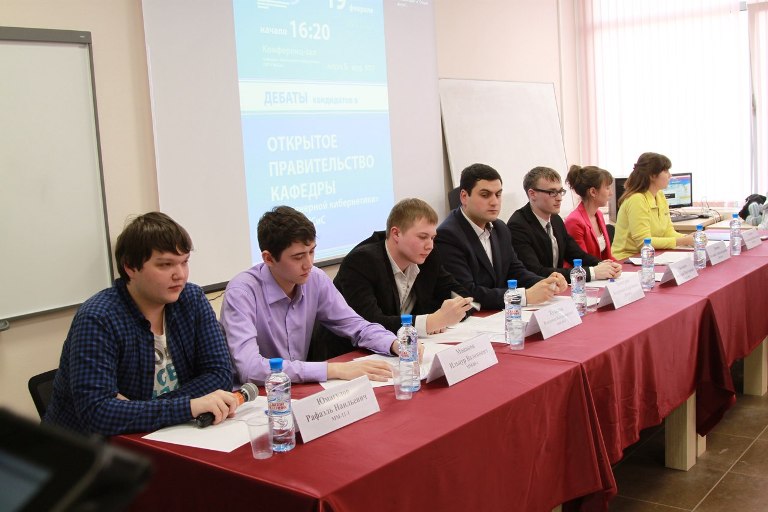
I also participated in the debate. I remember how worried I was then! All applicants for the post of a member of the Open Government were literally under fire from questions from the management of the department and students. Let me then and not everything turned out, but I think that in any case, participation in such events gives an invaluable experience of speaking in public, teaches quickly navigate in difficult situations.
And these are our graduates of 2013!

Hope to join them soon and become a graduate too. It remains to unlearn the last semester and write a diploma.
Instead of conclusion
I hope the information will be useful for applicants and entrants. The main thing - do not despair in the first courses! First, you need to get used to the new rhythm, and secondly, all the most interesting begins a little later, with the advent of specialized subjects. In addition, student life - is not only studying, but the opportunity to try yourself in different areas. This includes meeting new people, participating in common projects and moving to a new independent life.
Thanks for attention!
Source: https://habr.com/ru/post/192420/
All Articles